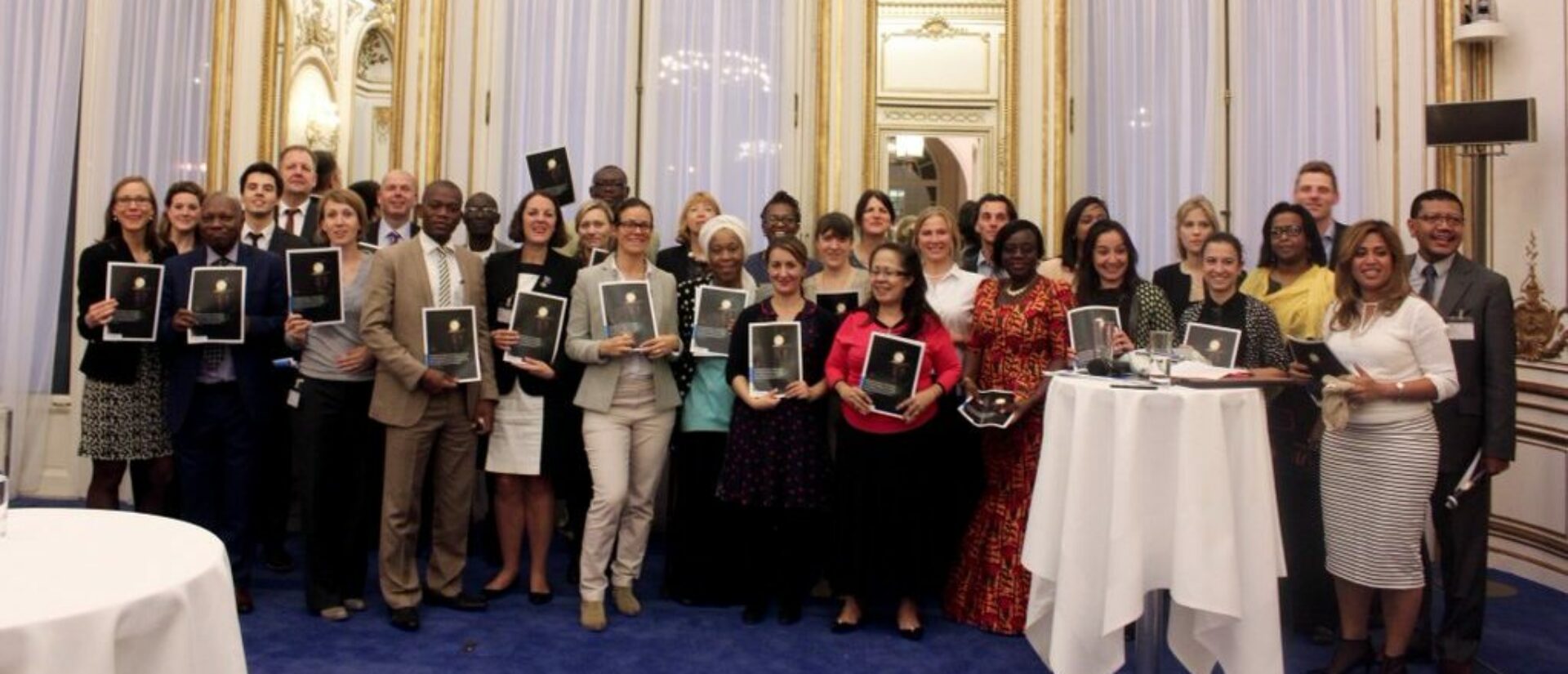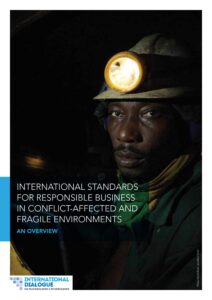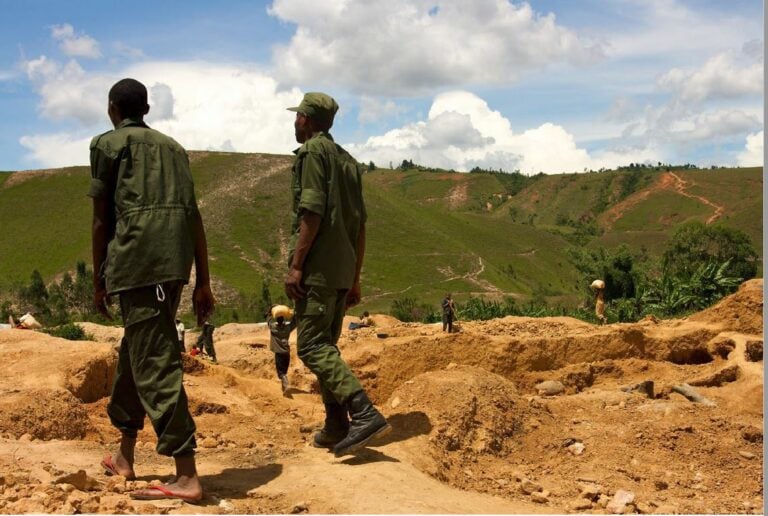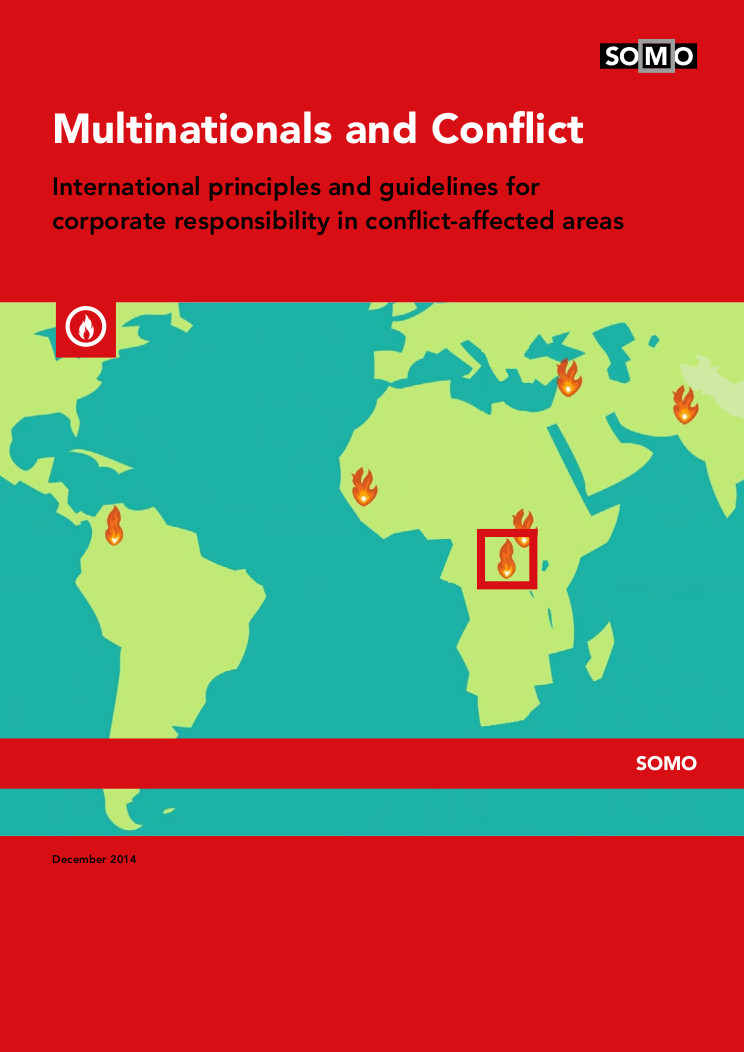
Responsible business in conflict settings
This week, the International Dialogue on Peacebuilding and Statebuilding officially launches its brochure ‘International Standards for Responsible Business in Conflict Affected and Fragile environments’, providing a concise overview of some of the key standards that can help businesses operate responsibly in conflict-affected and fragile environments.
Businesses operating in conflict-affected and fragile environments run the risk of making the wrong decisions and perpetuate the tensions that originally sparked the conflict. But, if they make the right decisions, they can help a country turn its back on conflict, and move towards lasting peace. For instance, a UK-based company trading coltan and cassiterite in the Democratic Republic of Congo(opens in new window) was accused by civil society groups of not implementing the OECD Guidelines for Multinational Enterprises. The company made illicit tax payments to an armed rebel group with a documented record of grave human rights abuses, and purchased minerals from mines in the DRC that employ child and forced labor. How do these and other companies make the right decisions? What international standards and guidelines have been designed to ensure that companies contribute to peaceful development?
Plethora of standards and guidelines
Over the past 15 years, a plethora of internationally accepted standards and guidelines have been developed for business and human rights, culminating in the adoption of the United Nations Guiding Principles for Business and Human Rights(opens in new window) in 2011. Many of these standards have special relevance for conflict-affected areas, such as the Voluntary Principles on Security and Human Rights(opens in new window) and the OECD Due Diligence Guidance for Minerals from Conflict-Affected Areas(opens in new window) . But often Governments, civil society actors, local businesses and business associations do not have easy access to user-friendly information on international standards. Also, there are still some major challenges related to the implementation of the different standards, as they have not notably improved multinational companies’ track record of human rights violations.
First of all, companies are hardly aware of the existence of the different guidelines. Companies may lack corporate commitment or capacity to implement international standards e.g. at the operational level, in particular small and medium sized companies, even when they committed themselves to observing these standards. In conflict-affected and fragile environments, they may find it difficult to fulfill their commitments in the absence of an enabling environment. At times, they operate without being held to account. Most international standards for responsible business conduct are voluntary and place no obligation on companies and governments to implement them. Existing guidelines and principles do not always offer the possibility to address wrongdoing or harm caused. Very few have a non-judicial grievance mechanism attached, with the exception of the OECD Guidelines(opens in new window) and the IFC Performance Standards(opens in new window) . This reduces the incentives to implement international standards, particularly in difficult environments, and undermines their effectiveness and credibility.
Easy-to-use brochure
 With this in mind, the International Dialogue on Peacebuilding and Statebuilding – housed within the OECD and a partnership between governments affected by conflict and fragility, donors and civil society organisations – collaborated with SOMO, to develop an easy-to-use brochure. The brochure aims at consolidating and distilling those standards most relevant to conflict affected and fragile contexts. It builds on the core principles of the New Deal for Engagement in Fragile States (New Deal), which was championed by the International Dialogue and signed up to by 40 countries and organisations in 2011. And it is a guide to effective engagement in conflict-affected and fragile environments, in ways that tackle the root causes of conflict and promote sustainable peace. Building the economic foundations for peace is pivotal to the New Deal which acknowledges the critical role the private sector can play in promoting peace when it acts responsibly.
With this in mind, the International Dialogue on Peacebuilding and Statebuilding – housed within the OECD and a partnership between governments affected by conflict and fragility, donors and civil society organisations – collaborated with SOMO, to develop an easy-to-use brochure. The brochure aims at consolidating and distilling those standards most relevant to conflict affected and fragile contexts. It builds on the core principles of the New Deal for Engagement in Fragile States (New Deal), which was championed by the International Dialogue and signed up to by 40 countries and organisations in 2011. And it is a guide to effective engagement in conflict-affected and fragile environments, in ways that tackle the root causes of conflict and promote sustainable peace. Building the economic foundations for peace is pivotal to the New Deal which acknowledges the critical role the private sector can play in promoting peace when it acts responsibly.
It is hoped that this brochure will be instrumental in overcoming the challenges mentioned and that it will encourage companies to implement the available standards and contribute to a lasting peace. Because especially in fragile environments, companies need to be extra vigilant to “do no harm” and operate in a conflict-sensitive way.
The International Standards for responsible business in conflict-affected and fragile environments(opens in new window) will be launched today at the OECD Conference Centre in Paris.
“SOMO’s excellent contribution to the development of the International Dialogue’s Brochure on International Standards for Responsible Business in Fragile and Conflict-Affected Environments, has been highly appreciated by colleagues inside and outside the OECD. SOMO’s conscientious approach to delivery and willingness to work iteratively and to tight deadlines, made them a pleasure to work with.”
Kathryn Nwajiaku-Dahou, Ph.D., Head of International Dialogue on Peacebuilding and Statebuilding Secretariat, OECD
Do you need more information?
-

Ilona Hartlief
Researcher
Related content
-
 EC’s Conflict minerals proposal must not be limited to four mineralsPosted in category:NewsPublished on:
EC’s Conflict minerals proposal must not be limited to four mineralsPosted in category:NewsPublished on: -
-

-
Multinationals and Conflict Published on:Mark van DorpPosted in category:PublicationMark van Dorp

-

-
Responsible Mining: Conflict Minerals Published on:
 Gisela ten KatePosted in category:Publication
Gisela ten KatePosted in category:Publication Gisela ten Kate
Gisela ten Kate

